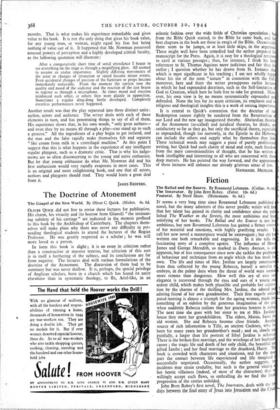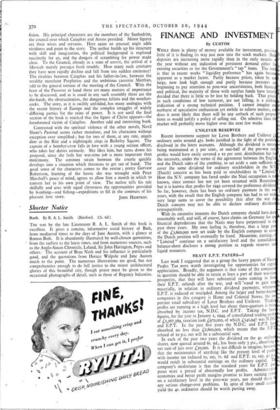Fiction
IT .seems a very long time since Rosamond Lehmann published novel, but the many admirers of this never prolific writer will fin that her talent has gained in clarity and confidence since she pu fished The Weather in the Streets, the most ambitious and has satisfying of her books. The Ballad and the Source is not le ambitious, but now Rosamond Lehmann has gained a firmer conic of her material and emotions, with highly gratifying results. T call her new novel a masterpiece would be extravagant ; but she h written one both remarkable and engrossing. In it she tells th fascinating story of a complete egotist. The influence of Hen James and George Meredith, so marked in Dusty Answer, is st apparent, but of less consequence since now she tackles the proble of behaviour and technique from an angle which she has made h own. The life and times of Mrs. Jardine are largely construct from data collected by the young Rebecca, herself a novelist embryo, in the palmy days when the threat of world wars seem more remote than dangerous. How well this era of ease a elegance is recovered through the eyes and ears of a young a ardent child, which makes both plausible and probable her captiva tion by the charms of the thrilling Mrs. Jardine, the adored a adoring friend of her own grandmother. Their first eagerly antici pated meeting is almost a triumph for the ageing woman, made in something of an eidolon by the generous imagination of the gir when suddenly Rebecca realises that her gracious hostess is actin The next time she goes with her sister to tea at Mrs. Jardine house they meet her grandchildren. The eldest, Maisie, hates th old woman. She and Rebecca become close friends. Anoth source of rich information is Tilly, an ancient Cockney, who in been for many years her grandmother's maid ; and so, slowly a painfully, a larger than life portrait of Sibyl Jardine is achieve There is the broken first marriage, and the wreckage of her husband career ; the tragic life and death of her only child, the beautiful gifted Ianthe ; and her final marriage to the drunkard, Harry. book is crowded with characters and situations, and for the rn, part the contact between life experienced and life imagined successfully negotiated. Occasionally, the author suggests. I" incidents may strain credulity, but such is the general vitality her heroic villainess (indeed, of most of the characters) that willingly accept such flaws, so enthralling do we find the her progression of the stories unfolded. John Brett Robey's first novel, The Innovator, deals with the f days between the final entry of Jesus into Jerusalem and the Cru
fixion. His principal characters are the members of the Sanhedrim, the council over which Caiaphas and Annas presided. Minor figures are their wives and servants. Here again an unusual angle adds vividness and point to the story. The author builds up his structure with skill and imagination, the political background is explored succinctly for us, and the dangers of scrambling for power made clear. To the Council, already in a state of unrest, the arrival of a Messiah merely presages fresh trouble. How many such creatures they have seen rapidly decline and fall from too sudden eminence! The rivalries between Caiaphas and his father-in-law, between the wealthy merchant Porphirios and the ambitious careerist Matthan, add to the general tension of the meeting of the Council. With the feast of the Passover at hand there are many matters of importance to be discussed, and as is usual in any such assembly there are the die-hards, the obstructionists, the dangerous leftists and the weather- cocks. The story, as it is swiftly unfolded, has many analogies with the recent history of Europe and the complex struggles of widely • differing parties for the reins of power. It is not until the final section of the book is reached that the figure of Christ appears—the foredoomed victim of Caiaphas. Another odd and interesting book.
Contrasted with the spiritual violence of the other novels, Nevil Shute's Pastoral seems rather mundane, and his characters without exception over simplified ; but for two of them, at any rate, angels dine at the Ritz and a nightingale sings in Berkeley Square. The captain of a bomber-crew falls in love with a young section officer, who takes her duties seriously. She likes him, but turns down his proposal, since she feels her war-time job is more important than matrimony. The constant strain between the couple quickly develops into a situation which threatens to get out of hand. The good sense of the characters comes to the rescue ; pretty Gervase Robertson, learning of the havoc she was wrought with Peter Marshall's peace of mind, agrees to allow him a month in which to convert her to. his own point of view. The author tells his tale skilfully and uses with equal cleverness the opportunities provided by bombing—and fishing—expeditions to fill in the contours of his



























 Previous page
Previous page